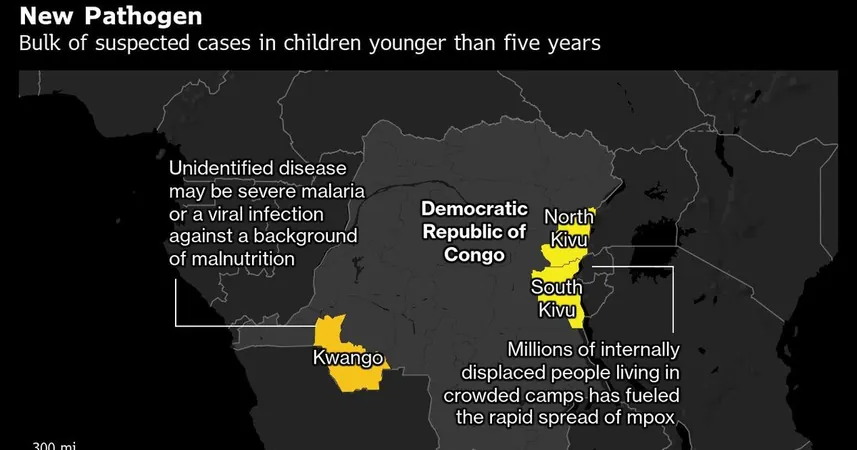
A New Health Crisis Unfolds in Congo: Deadly Mystery Illness Emerges Amid Hunger and Malaria Concerns
2024-12-19
Author: Amelia
Overview of the Health Crisis
In a startling health emergency, hundreds of individuals in the Democratic Republic of Congo (DRC) have fallen victim to a flu-like illness that appears to be a dangerous combination of diseases prevalent in the region. The situation is exacerbated by widespread malnutrition, particularly among vulnerable populations such as children under five years old, who are disproportionately affected.
Investigation and Initial Findings
Health officials from the Africa Centres for Disease Control and Prevention are currently investigating two primary hypotheses to explain this outbreak: severe malaria or a viral infection, both intensified by malnutrition. Tragically, the death of an adult male patient exhibiting hemorrhagic fever syndrome has fueled fears about the potential severity of this illness.
Current Statistics and Geographic Origin
As of now, over 500 cases have been documented since the outbreak began in October, with alarming reports indicating that a staggering 6.2% of those affected have succumbed to the illness—a figure that raises red flags for health authorities. The outbreak originated in the remote southwestern province of Kwango, which has once again stirred worrying thoughts about the emergence of a 'Disease X,' a term used to describe previously unknown pathogens with the ability to spread rapidly and globally.
Delayed Response and Challenges
After its initial detection in the Panzi health zone, it wasn't until over five weeks later that national authorities were duly notified on December 1. Compounded by challenges such as poor infrastructure and recent heavy rainfall, obtaining quality medical samples for diagnosis in Kinshasa, the DRC's capital, has been slow, hindering timely identification and response efforts.
Malaria Concerns
Malaria, notoriously one of the world's most neglected diseases, continues to pose a significant threat, particularly during the rainy season when conditions for the disease's transmission improve. The global health community has attempted to develop a vaccine, but the lack of commercial incentive has meant progress has been painstakingly slow. Notably, this year marked a significant milestone, as children in countries like Cameroon and Ivory Coast became the first in the world to receive malaria vaccinations.
Zoonotic Disease Risks
With Congo’s vast expanse—comparable in size to the combined states of Texas and Alaska—and its rich biodiversity, which includes 10% of the world’s tropical forests, the country is a critical area for further study into zoonotic diseases. Past outbreaks, including mpox and Marburg, have illustrated the risks associated with increased human-animal interactions in the region.
Global Health Implications and Future Outlook
Earlier this year, following the emergence of a new strain of mpox, the World Health Organization declared a public health emergency of international concern. However, the spread of mpox outside Africa has been sporadic to date.
As health authorities scramble to contain this growing crisis while addressing the broader implications of such diseases, the world watches closely. Will this new mystery illness be yet another warning sign of the urgent need for improved healthcare infrastructure, better disease surveillance, and effective interventions in vulnerable regions? Stay tuned for the latest developments on this unfolding health crisis in the heart of Africa.









 Brasil (PT)
Brasil (PT)
 Canada (EN)
Canada (EN)
 Chile (ES)
Chile (ES)
 España (ES)
España (ES)
 France (FR)
France (FR)
 Hong Kong (EN)
Hong Kong (EN)
 Italia (IT)
Italia (IT)
 日本 (JA)
日本 (JA)
 Magyarország (HU)
Magyarország (HU)
 Norge (NO)
Norge (NO)
 Polska (PL)
Polska (PL)
 Schweiz (DE)
Schweiz (DE)
 Singapore (EN)
Singapore (EN)
 Sverige (SV)
Sverige (SV)
 Suomi (FI)
Suomi (FI)
 Türkiye (TR)
Türkiye (TR)